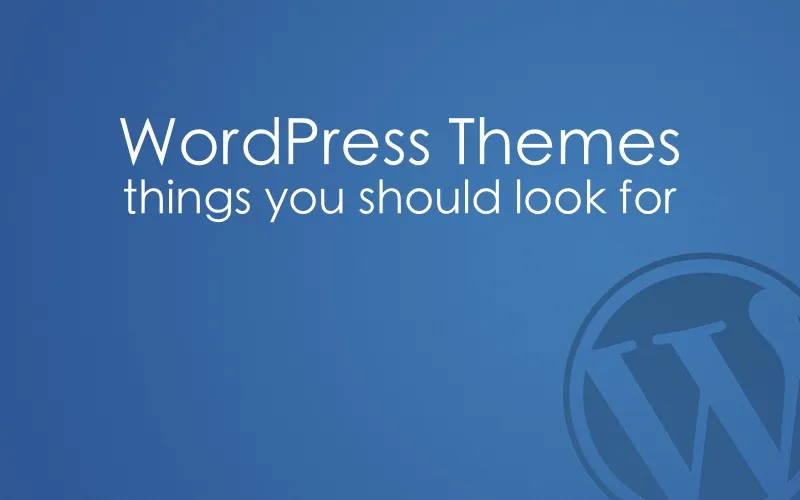The WordPress ecosystem has grown exponentially in the last few years and there’s a never ending supply of WordPress themes coming from independent developers and marketplaces. With so many choices available, how do you choose a WordPress theme? Should good design and typography be the only criteria or are there other things you should look for before picking a theme?

Tips for Choosing a WordPress Theme
Design is obviously the most important factor but not the only one. Most WordPress theme developers have a demo website where you can thoroughly evaluate the various features of their themes and these live demos can help you decide whether a theme is worth having or not.
How often is the theme updated? Look for the changelog where theme developers detail new features that have been added to the theme and the various bugs that have been fixed over time. Don’t go for themes that are elegant but haven’t been updated in past six months or ones that aren’t compatible with the most recent version of WordPress.
Is the theme fast enough? Take the URL of the live version of a WordPress theme and perform a speed test. The Google tool will help you quickly analyze the performance of various web pages of a WordPress powered site and you should prefer a theme with a page score higher than 70.
Is the theme Responsive? If you are buying a new WordPress theme, make sure that it uses responsive design and thus looks good on all screens from 27” monitors to 10” tablets to 4” mobile phones. While testing for responsiveness, pay special attention to how the various menus, inline tables and search boxes behave as you resize the browser.
Is the theme customizable? While any WordPress theme can be edited, you need not have to go to a programmer to make minor changes. A theme should allow you to switch to a different color scheme or let you use another font family without having to fiddle with CSS. Can you change the width of the sidebar, or remove it completely, without changing any HTML?
Is the code semantic? Well-formed semantic HTML5 markup helps search engines better understand the structured information inside your web pages. View the source code of your WordPress pages and look for semantic tags like section, article, footer, etc. You can also use the W3.org tool to know the semantics data available in a WordPress theme.
Is the code bloated? Open the HTML source of a WordPress theme and count the number of <script> tags. If you find half a dozen scripts embedded on that page, it maybe a good idea to explore other themes. I would also prefer to go with WordPress themes that use CSS sprites and icon fonts for small graphics.
Is the code intelligent? WordPress theme developers rely on JavaScript and jQuery plugins to add “visual” features like sliders, star ratings, social sharing buttons, syntax highlighting, animated transitions, etc. but these elements increase the weight of the page. A good theme should conditionally add JavaScript - the slider related JavaScript code should be included on pages that have the slider and not on every page of the site.
Does the theme offer hooks & filters? When you install a new WordPress theme, you will likely create a “child” theme and not change anything inside the parent theme. This helps because if the developer releases a new version later, you can easily upgrade without overwriting any of your changes. If a theme has its own hooks and action filters — say a hook for adding an excerpt just after the title — it becomes even easier for you to insert your own code into the WordPress theme without having to touch any PHP file in the parent or child theme.
Are shortcodes included? With shortcodes, you can easily included formatted content in your WordPress blog posts and pages with minimal markup. While shortcodes can be added to a theme through external plugins, it helps if certain shortcodes — likes the ones for adding testimonials, multi-column grids, maps, videos and form elements — are included in the theme itself.
Related: The Most Essential WordPress Plugins
Are major browsers supported? Your WordPress website should work and look consistent across all popular mobile and desktop browsers. You can use online tools like browsershots and browserstack to know if the theme you are looking to buy is really compatible with various web browsers.
Do they offer support? Once you buy a new theme, you’ll most definitely have questions around installation and customization of the theme and what better place to ask questions than the theme developer himself. Are they on Twitter? Do they have a support forum? Are the theme developers actively answering user queries? This will also help you discover other website where that particular WordPress theme is currently live.
Is the theme original? Websites like Medium or Quartz have excellent designs and you can easily find dozens of WordPress themes — both free and commercial — that are exact clones of these beautiful websites. These should be avoided as web design is intellectual property too.


